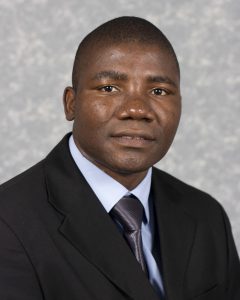By Jessica Pardo, Communications Specialist, SWS
Davie Kadyampakeni is a new Soil and Water Sciences assistant professor at the UF/IFAS Citrus Research and Education Center in Lake Alfred. His specialization is citrus water and nutrient management, focusing on water management and conservation, nutrient management, irrigation and drainage management, best management practices, crop production, and soil crop modeling.

Kadyampakeni received a B.S. and M.S. from the University of Malawi and a Ph.D. from the University of Florida (UF). Earlier in his career, Davie worked for multiple employers including the Department of Agricultural Research Services as an Irrigation Agronomist, International Crops Research Institute as a Scientific Officer, the World Bank – International Fund for Agricultural Development as an Irrigation Specialist, UF Institute of Food and Agricultural Sciences Southwest Florida Research and Education Center as a Graduate Research Assistant and thereafter as Postdoctoral Research Associate, and the International Water Management Institute (IWMI) as an Agricultural Water Management Specialist. At IWMI, Davie’s work focused primarily on implementing improved agricultural water management practices in West Africa, building capacity of irrigation practitioners and institutions, and development of new approaches in irrigation management to help small- and large-scale farmers cope with vagaries of nature related to climate change. Research interests at IWMI included understanding water management interactions with ecosystem services and climate resilience, evaluation of promising micro-irrigation technologies for adaptation in West Africa, and use of GIS and other applications in irrigation decision-making options for small-, medium, and large-scale farmers. He led the IWMI projects on Africa Rising (AR), Innovation Lab for Small-Scale Irrigation (ILSSI), Securing Water for Seed and High-value Vegetable Production (SecureWater), Drylands Systems CGIAR Research Program (DSCRP) and Climate Change in Agriculture and Food Security in West Africa.
Davie joins the Citrus Research and Education Center (CREC) as an Assistant Professor in citrus water and nutrient management. His research and extension program goals focus on 1) developing and implementing sustainable strategies that optimize water management for citrus production, conservation of water, and water quality; 2) conducting research to improve water use efficiency in citrus production systems, minimizing water quality degradation, and maximizing productivity; 3) developing local and regional water use models taking into consideration citrus planting systems, tree water requirements, irrigation scenarios, and water use for cold protection; 4) applying precision agricultural technologies for local and regional water management; and 5) developing best water and nutrient management practices for water conservation and quality maintenance for surface and ground water sources. Research and extension interests include soil and water management and conservation; nutrient management through conventional and precision agricultural practices; irrigation and drainage management; micro-irrigation; water and nutrient best management practices; crop production; and soil and crop modeling.
In an effort to get to know Dr. Kadyampakeni more personally, I asked him a few questions about his research and new position here at UF.
At what point in your life did you know that you wanted to be a soil scientist?
I grew up in a family where my parents were teachers and also medium-scale farmers in Malawi. I liked farming and enjoyed looking at soil quality as related to crop production and farming systems. It was in my high school days that I developed the interest to pursue a career in agricultural sciences. Since there was no soil science major in the undergraduate program, I made sure to take as many classes that were related to soil science such as soil morphology, soil fertility, soil mechanics, plant nutrition, soil and water conservation. In my graduate program, I further established a special interest in soil physics, chemistry and fertility and how these interact with water management for crop production.
What led to your move to UF?
I thought of moving from the International Water Management Institute (IWMI) to UF to contribute to IFAS’s teaching, research and extension goals through capacity development of emerging researchers and students, development of water- and nutrient-saving techniques for profit maximization and environmental sustainability, and application of sound environmental stewardship through implementation of best water and nutrient management practices.
What are you most excited about as a new UF/IFAS faculty member?
I am happy to be able to develop a robust research and extension program and contribute to on-going efforts in sustaining environmental and water quality in the state. I look forward to working with colleagues within the department, IFAS and other agencies in achieving my key goals state-wide, nationally and globally in achieving positive impacts in environmental management.
What is your vision for the Citrus REC and its impact on citrus water and nutrient management?
I look forward to contributing to the development of new recommendations on water and nutrient management of trees infected with citrus greening. Current recommendations are tailored for healthy or asymptomatic trees. In addition, I plan to craft novel water and nutrient management technologies to help growers make judicious decisions on resource use and ensure production efficiency.
Do you have any suggestions or recommendations to hobby citrus growers and homeowners with citrus trees?
I will be happy to work with such growers in their water and nutrient management decisions and ensure they get high fruit yields per unit of water and fertilizer.
What do you foresee as being the biggest challenge to Florida’s citrus industry?
Citrus greening remains the largest challenge because it has wiped out more than 40-50% of the trees across the state. Solutions range from development of disease tolerant or resistant cultivars, which will require sound water and nutrient management practices to ensure high productivity, to management of the disease’s vector (to curtail further infections and disease spread). Another key challenge remains the sandy soil characteristic that make water and nutrient management extremely difficult. Water and nutrient saving technologies will be key in improving citrus productivity on Florida’s sandy soils.
What motivates you most to go to work every day?
I want to make a significant difference in the citrus industry through my professional skills and hard work.
 0
0
